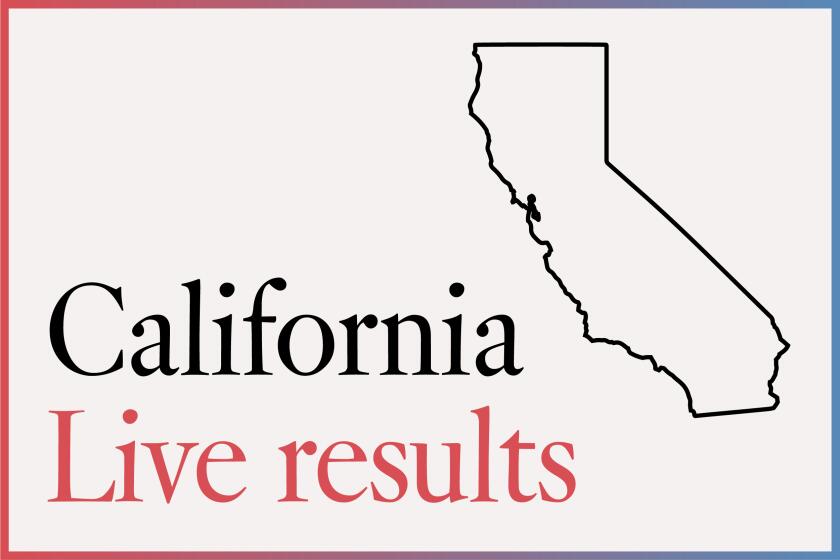Proposition 15 to loosen California’s business property tax rules is trailing

- Share via
SACRAMENTO — Proposition 15, an effort to remove high-value business properties from the low-tax protections enacted by California voters more than four decades ago, was trailing on Wednesday morning, after an expensive and fierce campaign over how much to spend on government services and the economic effects of raising taxes.
The ballot measure was failing by a narrow majority with more than 11.5 million ballots counted, a shortfall that was far from certain with millions of votes left to count.
The ballot measure seeks to curtail the rules governing property taxes that were established by Proposition 13 in 1978, which set the annual levy at 1% of a property’s value and allows only small adjustments to the assessed value until there is a change in ownership. Those strict limits apply to all property owned in California — both homes and businesses.
Proposition 15 would create a separate set of tax rules for commercial and industrial property holdings worth $3 million or more. County tax assessors would be required to revise the value of those business properties to reflect current market prices, increasing the total taxes paid.
Independent estimates concluded the commercial property tax increase could boost revenue for schools and local services by as much as $11.5 billion a year once fully implemented in 2025. Approximately 40% of the revenue would be sent to K-12 schools and community colleges while the remaining 60% would be provided to counties, cities and special districts for services such as law enforcement and fire suppression.
As the campaign season came to an end, the messaging on both sides was clear.
Supporters said Proposition 15 would boost crucial public services by making large corporations pay property taxes more in line with what they can afford, noting that land values of some Bay Area and Southern California business-owned properties have changed very little since the 1970s. Opponents, meanwhile, insisted higher taxes paid by corporations would trickle down to small businesses and consumers at a precarious time for the state’s economy.
The final public poll, conducted last week by the UC Berkeley Institute of Governmental Studies, found 49% of likely voters said they would vote for Proposition 15 and 42% said they were opposed — an uptick in opposition from the institute’s September poll but no change in the number of supporters.
One claim of opponents, that Proposition 15 is the first step toward higher homeowner property taxes, was both ominous and unfounded. The ballot measure made no changes to residential taxes. But the UC Berkeley poll showed some voters believed the accusation.
Instead, the ballot measure asked voters to embrace the most talked-about idea for changing Proposition 13, a “split roll” of business properties that could be taxed based on market value.
Voters will likely consider a proposal in 2020 to limit Proposition 13’s tax limits to homeowners, boosting assessments on commercial properties and using much of the money on K-12 schools.
That the effort even made it to the ballot reflects how much California has changed since the tax revolt led by the late Howard Jarvis in 1978. For decades, the political potency of Proposition 13 kept at bay any effort to rethink its sweeping provisions. Voters routinely said they still supported the landmark law, though they also lamented sharp cuts in school funding — the result, in some cases, of California’s reliance on volatile personal income tax revenues to replace the property taxes they had voted to cut.
Supporters of the split roll idea carefully chose their timing, believing the fall election this year would attract a high turnout of voters sympathetic to the idea of a tax increase on big business. But opponents of Proposition 15 focused their efforts on what they said was the ballot measure’s indifference to small business tenants, who often pay a portion of the building owner’s property taxes in their monthly rent, and its confusing language about exemptions for the agricultural industry.
The battle lines over Proposition 15 were unsurprising. Liberal Democrats and organized labor supported the ballot measure, as did Gov. Gavin Newsom. The state’s largest businesses strongly opposed it, along with anti-tax groups and a variety of groups that advocate for small businesses. The coalitions on both sides of the property tax increase were similar to those formed over tax increase proposals in 2012 and 2016 — campaigns that ended with voters approving both of the ballot measures.
More to Read
Sign up for Essential California
The most important California stories and recommendations in your inbox every morning.
You may occasionally receive promotional content from the Los Angeles Times.












